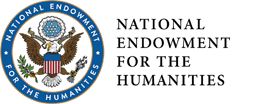Humanities to Go is made possible in part by generous support from

 New Hampshire Humanities programs are made possible in part by a grant from the National Endowment for the Humanities (NEH). Any views, findings, conclusions or recommendations expressed in this these programs do not necessarily represent those of the NEH or New Hampshire Humanities.
New Hampshire Humanities programs are made possible in part by a grant from the National Endowment for the Humanities (NEH). Any views, findings, conclusions or recommendations expressed in this these programs do not necessarily represent those of the NEH or New Hampshire Humanities.